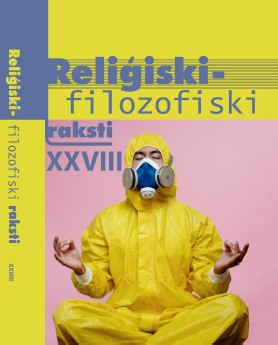DŽONS MILBANKS: RADIKĀLĀS ORTODOKSIJAS PERSPEKTĪVA
JOHN MILBANK: THE PERSPECTIVE OF RADICAL ORTHODOXY
Author(s): Jānis MeļņikovsSubject(s): Christian Theology and Religion, Political Philosophy, Philosophy of Religion, Politics and religion, Social Theory, Ontology
Published by: Latvijas Universitātes Filozofijas un socioloģijas institūts
Keywords: John Milbank; social theory; theology; Radical Orthodoxy; politics;
Summary/Abstract: In this essay, the author will outline John Milbank’s theological perspective on liberalism and postmodernity. Milbank is not a well-known thinker in Latvia; however, he has shaped and influenced thought beyond theology and therefore, he is an interesting thinker to be looked at. The author of the essay is going to introduce J. Milbank’s seminal work Theology and Social Theory: Beyond Secular Reason to Latvian academic environment. Milbank has not been ignored completely, yet he deserves more attention in the context of modern-day issues. John Milbank, a British theologian, up to 2018 worked as a professor of theology, politics, and ethics at the University of Nottingham. He is one of the most influential theologians nowadays, who had achieved worldwide recognition by 1990 by publishing work Theology and Social Theory: Beyond Secular Reason. The work was published at the time when theology was struggling on the brink of irrelevance to the modern world and science. Milbank’s work is considered as a source of inspiration for the movement of Radical Orthodoxy, which is described as “theological sensitivity” (Smith 2004: 11) rejecting duality between nature and grace or materiality and spirit. It is an attempt to restore theology back into the field of science as a valid discipline of science that can give analyses of the overall human life and deeds. Radical Orthodoxy tries to give an alternative version of modernity while criticising liberalism and secularism. Smith describes Radical Orthodoxy as “a call to look again at things one has too often assumed. [Radical Orthodoxy is] a hermeneutic disposition and a style of metaphysical vision” (Smith 2004: 65). By employing genealogy and deconstructionist methodology, Milbank is exposing the prejudice of modernity and liberalism and proposing a different perspective. Milbank takes a very broad view on the issue and by analysing thinkers starting from the antiquity up to nowadays shows the ill logic that has shaped the world of liberalism. The basic theses of Milbank are that secularism is the state that was provoked by bad theology or Christian heresy. A significant turning point in the theological perspective is John Duns Scotus, who saw the relationship between the infinite and finite beings as having a univocal meaning. God and creation have the same being but God’s being is quantitatively bigger. Consequently, God is turned into an object of faith, yet is distant and separated from rationality. Impossibility to breach the gap between the infinite and finite makes one reject the religious domain and hence creates the secular one. It is an autonomous human being ridden of all religion. In combination with the ontology of violence perpetuated since the antiquity, human development has taken a trajectory that brings development to humanity yet now has exhausted itself and requires certain replacement or renewal. Milbank opposes to the secular power of social sciences as the only way to interpret society. Milbank proposes restoration of theology returning to the metanarrative positions in giving overall analysis and explanation of humanity (Milbank 2006: 383). By doing so, Milbank suggests, societies might be able to find the way out of the current crisis of liberalism.
Journal: Religiski-filozofiski raksti
- Issue Year: XXVIII/2020
- Issue No: 1
- Page Range: 74-95
- Page Count: 22
- Language: Latvian

